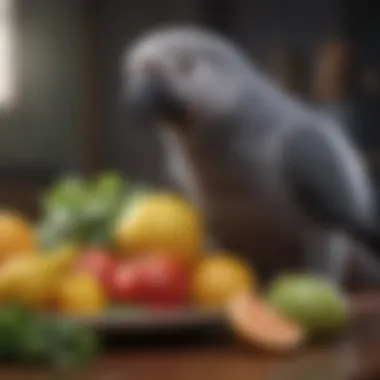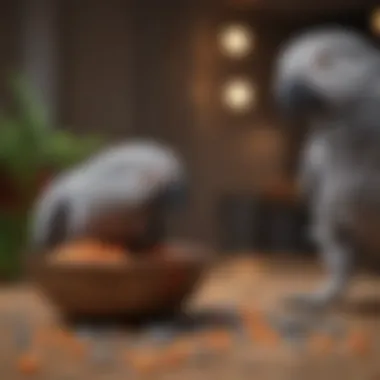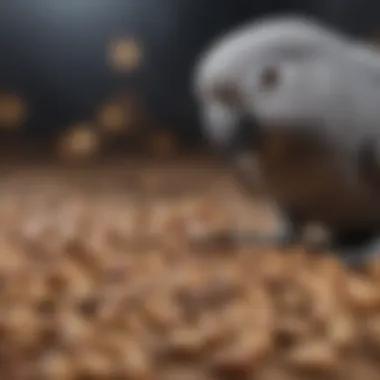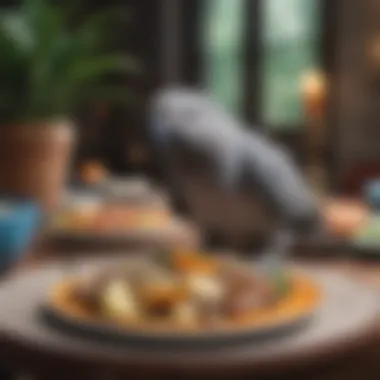Ultimate Guide to Grey Parrot Nutrition and Feeding


Intro
Grey parrots are among the most intelligent and social birds known to man. Their remarkable cognitive abilities and vibrant personalities make them beloved companions. However, these traits come with significant responsibilities, especially in terms of nutrition. Proper diet is pivotal to maintaining a grey parrot's health and happiness. This guide aims to cover essential aspects of their dietary needs and overall care, ensuring these exceptional birds thrive in a home environment.
Pet Care Essentials
Daily Nutrition Requirements
Grey parrots require a balanced diet to flourish. A well-rounded meal plan must include a variety of foods. Key components are:
- Pellets: High-quality pellets should form the base of their diet. These are formulated to provide essential vitamins and minerals. Brands like Harrison's and Kaytee are commonly recommended.
- Fruits and Vegetables: Fresh produce is vital. Leafy greens, carrots, apples, and berries are excellent choices. Aim for a mix to ensure diverse nutrient intake.
- Nuts and Seeds: These can be offered in moderation. While they are energy-rich, they should not dominate the diet. Nuts like almonds, walnuts, and sunflower seeds are good options.
An important practice is to avoid giving grey parrots avocados, chocolate, and caffeine. These substances are toxic and can lead to serious health problems.
Exercise and Playtime
Physical activity is crucial for grey parrots. They are naturally active creatures. Providing ample opportunities for flight and play can help maintain their physical and mental well-being. Ideally, they should have several hours outside their cage each day. Engaging toys and climbing structures encourage exercise and prevent boredom.
Grooming Tips
Grooming is another essential aspect of care. Regular beak, feather, and nail maintenance is important. Offering cuttlebone can assist with beak health. Additionally, routine baths help keep their feathers clean and promote grooming behavior.
Health and Wellness Check-ins
Regular veterinary check-ups should be part of a grey parrot's routine. These visits allow for early detection of potential health issues. Owners should look for signs of illness such as changes in appetite, behavior, or droppings. Timely action can prevent serious complications.
Taking care of a grey parrot requires dedication. The right nutrition, alongside physical and mental stimulation, supports a long and healthy life.
End
Catering to the dietary and care needs of grey parrots is essential for their longevity and happiness. A well-balanced diet, combined with attentive play and grooming, ensures they live fulfilling lives. Understanding these foundational elements equips current and prospective owners to foster a healthy environment for their feathered companions.
Understanding Grey Parrots
Understanding the nature and needs of grey parrots is crucial for their well-being. These intelligent and social birds thrive in an environment that caters to their physiological and psychological requirements. By learning their species characteristics, habitat, and diet, pet owners can make informed decisions about their care. Grey parrots are not just pets; they are complex beings that enjoy social interaction and mental stimulation. This section will cover the essential components that contribute to the health and happiness of grey parrots.
Species Overview
Grey parrots, scientifically known as Psittacus erithacus, are renowned for their remarkable cognitive abilities. They can mimic human speech and exhibit behaviors indicating a deep understanding of their environment. Two primary subspecies include the African Grey and the Timneh Grey. The African Grey has a striking grey coloration with red tail feathers, while the Timneh Grey is slightly smaller and darker. Both types are recognized for their social structure in the wild, living in flocks that provide companionship and a learning environment.
Grey parrots have an average lifespan ranging between 50 to 70 years in captivity, making their long-term care a significant commitment. Understanding their behavior and needs can lead to a fruitful relationship between parrot and owner.
Natural Habitat and Diet
In the wild, grey parrots primarily inhabit the rainforests of West and Central Africa. Their natural habitat is abundant with fruits, seeds, nuts, and vegetation. This diverse diet provides essential nutrients necessary for their survival and health. In the wild, grey parrots also engage in foraging behavior, seeking out food with their keen eyesight and intelligence. This natural instinct must be considered when planning their diet in captivity.
Dietary variety is key. Pet owners should aim to mimic their natural feeding routines to provide balanced nutrition. Foods should include a wide range of fruits and vegetables, seeds, and specially formulated pellets designed to meet their unique needs. It is important to avoid feeding them unhealthy foods, which can lead to serious health issues.
A balanced diet emulating their natural feeding patterns promotes health and longevity in grey parrots.
This understanding of grey parrots emphasizes the importance of catering to both their physical and mental needs to ensure they lead a fulfilling life.
Nutritional Requirements
Understanding the nutritional requirements of grey parrots is essential for ensuring their overall health and well-being. These intelligent birds need a balanced diet that includes a variety of nutrients. Proper nutrition can prevent health issues, enhance longevity, and promote an active lifestyle. Recognizing the specific nutritional needs enables pet owners to make informed choices about their birds' diets.
Essential Nutrients


Grey parrots thrive when their diets are rich in essential nutrients. These nutrients can be broadly categorized into three main groups: vitamins and minerals, amino acids, and fats and carbohydrates. Each group plays a crucial role in maintaining the health and vitality of these birds.
Vitamins and Minerals
Vitamins and minerals are fundamental elements in a grey parrot's diet. They serve various functions, such as supporting immune function, preserving skin and feather health, and facilitating metabolism. For instance, Vitamin A is crucial for maintaining good vision, while calcium is necessary for strong bones and eggshell formation in breeding birds.
One key characteristic of vitamins and minerals is their bioavailability, which impacts how well these nutrients are absorbed. Natural sources—like leafy greens and vegetables—offer better bioavailability compared to synthetic supplements. However, the unique feature of these nutrients also lies in their specific requirements; too much can lead to toxicity. Therefore, balanced supplementation is necessary.
Amino Acids
Amino acids are the building blocks of proteins, which are vital for growth, repair, and maintenance of body tissues. Grey parrots require a variety of amino acids, both essential and non-essential, for optimal health. The inclusion of protein-rich foods, like legumes and certain seeds, is vital.
A key characteristic of amino acids is their role in the production of hormones and enzymes, which are essential for various biological processes. A diverse selection of protein sources guarantees that all essential amino acids are provided. However, the unique feature of amino acids is that they can affect behavior. For example, adequate protein can promote healthier plumage and energy levels, reducing stress and aggression in these birds.
Fats and Carbohydrates
Fats and carbohydrates provide energy and support various bodily functions in grey parrots. While fats are energy-dense nutrients that also assist in the absorption of certain vitamins, carbohydrates serve as a quick energy source. Including healthy sources of fats, such as nuts and seeds, can offer benefits like improved feather quality and skin health.
One key characteristic of fats is that they are essential for hormone production and cell membrane integrity. Carbohydrates, on the other hand, are crucial for maintaining proper energy levels. Including both in moderation can foster an energetic and playful parrot. The unique feature here is the balance needed; excessive fat can lead to obesity, while inadequate carbohydrates can deplete energy.
Recommended Daily Intake
When it comes to the recommended daily intake, it is important for owners to understand how much of each nutrient their grey parrot requires. This varies based on age, activity level, and overall health. Follow up-to-date guidelines that help balance the diet, ensuring that grey parrots receive the nutrition they need to thrive.
Types of Food for Grey Parrots
Understanding the various types of food available for grey parrots is crucial for their health and well-being. A balanced diet that combines different food sources ensures that these intelligent birds receive the necessary nutrients. This section will delve into both commercial feed options and fresh food alternatives. Each category plays a significant role in ensuring the nutritional adequacy and overall happiness of grey parrots.
Commercial Feed Options
Commercial feed can provide a convenient and balanced way to meet a grey parrot's nutritional needs. Owners can choose from a variety of products tailored to the specific dietary requirements of these birds.
Pelleted Diets
Pelleted diets are widely recommended in avian nutrition. These products contain a balanced mix of essential nutrients that grey parrots require for their health. The key characteristic of pelleted diets is that they are formulated to provide all necessary vitamins, minerals, and proteins in a single product.
One unique feature of these diets is their uniformity. Unlike seed mixes, pellets do not allow for selective feeding, which means that parrots receive a comprehensive nutrient profile with every bite. This reduces the risk of nutritional imbalances that can arise from a seed-based diet. However, some birds may be hesitant to transition to pellets, and it may require patience from the owner.
Seed Mixes
Seed mixes have been a traditional staple in the diet of many pet birds, including grey parrots. Some important aspects of seed mixes involve their availability and variety. They can range from basic blends to specialized formulas designed for specific species, allowing customization for individual preferences.
The key characteristic is that seed mixes are often appealing to the taste. They can be rich in fats, providing energy for active birds. However, one major concern is that parrots tend to pick out their favorite seeds and avoid others, leading to potential nutritional deficiencies. Seed mixes should therefore be offered in moderation, supplemented with other food types to ensure a well-rounded diet.
Treats and Supplements
Treats and supplements can serve an important role in enhancing a grey parrot's diet. These can include products like nuts, dried fruits, or specially formulated bird-safe snacks. The key characteristic of these items is their ability to add variety, making meals more enticing for parrots.
However, it is important to use treats wisely. They should not be the primary component of a grey parrot’s diet due to their often high-fat content and low nutritional density. Instead, treats can be utilized for training or occasional rewards. Always read labels to ensure that any treats offered do not contain harmful ingredients.
Fresh Foods
Fresh foods are essential for a well-rounded diet in grey parrots. They provide hydration, texture, and additional nutrients that commercial feeds may lack. Integrating a variety of fresh options can invigorate a grey parrot's menu.
Fruits and Vegetables
Fruits and vegetables are rich in vitamins, minerals, and antioxidants, which contribute positively to a grey parrot's health. The vibrant colors and varying textures often attract birds, encouraging them to engage with their food. Fresh produce also promotes hydration due to its high water content.


The unique feature of fruits and vegetables is their freshness. Unlike processed foods, they retain their nutrients better when served soon after purchase. However, it is crucial to wash all produce thoroughly to eliminate any pesticide residues and avoid feeding them on a daily basis to prevent overconsumption of sugars found in some fruits.
Nuts and Seeds
While nuts and seeds can be part of a grey parrot's diet, they should be fed in moderation. Nuts provide a good source of protein and healthy fats. The major benefit is their palatability, making them a highly favored choice among many birds. Certain nuts, like walnuts and almonds, offer additional nutrients essential for overall health.
The disadvantage, however, lies in their high-fat content, which, if overfed, can lead to obesity. Balancing nuts with lower-fat options like fruits and vegetables is necessary to ensure a healthy diet without excess calories.
Grains and Legumes
Grains and legumes contribute essential carbohydrates and proteins to a grey parrot's diet. Foods such as brown rice, cooked quinoa, and lentils provide energy and nutrients that support overall health. The key characteristic of these foods is their digestibility, making them suitable for daily feeding.
Including grains and legumes can diversify a grey parrot's diet. However, they need to be prepared correctly and should not be the only food source. Offering them as part of a varied menu will maximize the nutritional benefits while minimizing the risk of selecting one food item over others.
Feeding Practices
Feeding practices are vital for ensuring the health and well-being of grey parrots. A structured feeding routine leads to better digestion and overall happiness in these intelligent birds. Understanding the nuances of feeding will help owners provide an optimal diet that meets their grey parrot's unique needs.
Frequency of Feeding
Establishing a regular feeding schedule is crucial for grey parrots. Most experts recommend feeding adult grey parrots twice a day. This helps to mimic their natural foraging habits and maintains stable energy levels throughout the day. For younger grey parrots, more frequent feeding may be necessary, around three to four times daily, to support their growth and development. Always observe your bird’s behavior. If they seem particularly hungry between meals, it could be a signal to adjust feeding frequency.
Portion Sizes
Portion sizes can significantly influence a grey parrot's health. It is important to ensure that these birds receive adequate nutrition without overfeeding. A general guideline is to offer about 1/4 to 1/2 cup of pellets, along with a similar amount of fresh fruits and vegetables, per feeding. Monitoring your parrot’s body condition is essential. If your bird appears overweight or underweight, adjust the portion sizes accordingly. Regularly weigh your grey parrot to assess any changes in weight, ensuring they remain within a healthy range.
Safe and Unsafe Foods
Understanding which foods are safe or unsafe for grey parrots is essential for their health. Here are some safe food options:
- Fruits: Apples, bananas, and berries.
- Vegetables: Carrots, spinach, and bell peppers.
- Nuts: Almonds and walnuts should be given in moderation due to high-fat content.
- Seeds: Sunflower seeds can also be a treat but not the main diet.
Conversely, some foods can be toxic or harmful:
- Avocado: Contains persin, which is dangerous for birds.
- Caffeine: Can cause serious health issues.
- Chocolate: Toxic for many pets, including birds.
- Onions and Garlic: These can cause oxidative damage to red blood cells.
Always double-check any unfamiliar food items before offering them to your parrot.
Promoting sound feeding practices not only enhances the diet of grey parrots but also contributes positively to their overall health and behavior. A balanced and mindful approach to feeding will ensure a thriving pet.
Common Dietary Misconceptions
Understanding dietary misconceptions is essential for grey parrot owners who seek to provide optimal care for their pets. These myths can lead to poor nutritional choices that affect the health and well-being of these intelligent birds. Clarifying these myths allows owners to make informed decisions that align with the true needs of grey parrots.
Common Myths About Grey Parrot Nutrition
One of the most pervasive myths is that grey parrots can thrive solely on a seed-based diet. In reality, while seeds can be part of their diet, they lack essential nutrients. Grey parrots require a balanced mixture of fresh fruits, vegetables, and fortified pellets to ensure they receive all necessary vitamins and minerals.
Another misconception is that all human foods are safe for grey parrots. Foods such as avocado, chocolate, and caffeine are toxic to birds. It's crucial to research which human foods are safe before offering them to your parrot.
Some owners believe that since grey parrots are highly social, they should always eat the same foods as their owners or other family members. This approach can be detrimental. A diet tailored specifically for grey parrots takes into account their unique ανάγκες, ensuring they receive proper nutrition.
Understanding Bird Behavior Related to Food
Grey parrots exhibit specific behaviors that relate to their eating habits. Their foraging instincts drive them to explore and manipulate their food, which is vital for their physical and mental stimulation. Providing a variety of food shapes and textures can encourage this natural behavior.
Moreover, grey parrots are known to be quite selective with their food. They may reject certain items, leading to a misunderstanding about their preferences. Owners should offer a broad range of options, as birds might enjoy different items on different days.


Educational resources can also aid in understanding these behaviors. Engaging with communities on platforms like reddit.com can provide insights. Additionally, consulting with literature from sources like britannica.com helps clarify uncertainties regarding grey parrot nutrition.
Recognizing and dispelling dietary misconceptions is vital in preventing malnutrition and ensuring a healthy, fulfilling life for grey parrots.
Special Considerations
The dietary needs of grey parrots can vary significantly depending on their life stage and reproductive status. Understanding these nuances is key for any owner who seeks to provide optimal care. This section will address critical considerations for both breeding and aging grey parrots. Emphasizing tailored nutrition enhances overall health, supports breeding success, and addresses age-related concerns.
Diet for Breeding Grey Parrots
Breeding is a crucial period in the life of a grey parrot and their dietary needs peak during this time. The right nutrition can bolster reproductive health and support successful nesting. A breeding grey parrot requires an increase in specific nutrients, including calcium, protein, and certain vitamins. This combination is vital for egg production and the development of a healthy clutch.
- Calcium: This mineral is essential for strong eggshell formation. Including calcium-rich foods like dark leafy greens, cuttlebone, and specialized supplements can greatly benefit breeding females.
- Protein: Increased protein intake helps support the energy and metabolic demands of breeding. Foods like cooked legumes, natural seeds, and high-quality pellets should be incorporated into their diet.
- Vitamins: Certain vitamins, particularly A and D3, play a role in reproductive health. Ensuring a diverse intake of fresh fruits and vegetables can help meet these requirements.
While preparing food, be mindful of the potential for overfeeding. Maintaining a balanced approach is essential in this phase. Overindulgence can lead to obesity and other health problems.
Dietary Needs of Aging Grey Parrots
As grey parrots age, their nutritional needs can change significantly, prompting adjustments in their diet. Older parrots may experience various health issues such as reduced metabolism, dental problems, and decreased digestion efficiency. Tailoring their diet to meet these unique requirements is crucial for maintaining their overall well-being.
Key considerations for feeding aging grey parrots include:
- Easier to Digest Foods: Older parrots may struggle with hard seeds and pellets. Offering softer food options, like moistened pellets and cooked grains, can aid digestion.
- Increased Antioxidants: Antioxidants can combat age-related issues. Foods such as berries and colorful vegetables can be beneficial here.
- Hydration: Ensuring that the parrot stays well-hydrated can help with digestion and overall health. Fresh water should always be accessible.
- Weight Management: Aged birds may become less active, which can lead to obesity. Monitoring portion sizes and adjusting food types can maintain a healthy weight.
Monitoring Diet and Health
Monitoring the diet and health of grey parrots is not just a matter of convenience; it is vital for their overall well-being. A well-balanced diet directly influences the physical health, behavior, and longevity of these intelligent birds. Owners need to take an active approach in observing what their parrots consume and their behavioral changes, as these factors can indicate broader health issues.
Regular assessment of their diet helps prevent nutritional deficiencies and ensures they receive all necessary nutrients. Given the complexities of a grey parrot's dietary needs, understanding how to manage and oversee their eating habits offers a pathway to a healthier life for these birds. Adopting a proactive approach can bring noticeable benefits, including improved plumage, better mood, and increased playfulness.
Recognizing Nutritional Deficiencies
Recognizing signs of nutritional deficiencies in grey parrots is crucial. Various symptoms can indicate dietary imbalances, including feather plucking, weight changes, or lethargy. Some common indications include:
- Feather Issues: Dull feathers or excessive molting may suggest a lack of essential fatty acids or protein.
- Weight Loss: Unintentional weight loss may indicate insufficient caloric intake or a lack of vital vitamins.
- Behavioral Changes: Increased irritability or decreased activity can stem from nutrient deficiencies.
It is essential for owners to observe their pets closely. If any of these signs are present, it may be time to adjust their diet or consult a veterinarian. Regular check-ups can help in identifying issues before they become severe.
Consulting with an Avian Veterinarian
Consulting with an avian veterinarian is a wise step in maintaining the health of grey parrots. A specialized vet can perform nutritional assessments and provide tailored advice based on the individual bird's needs. Owners should not hesitate to seek professional guidance when there are concerns about dietary changes or health issues.
Visits to the veterinarian should include discussions about:
- Current food types and any recent changes.
- Signs of health or behavioral changes observed at home.
- Blood tests or other diagnostics to evaluate nutrient levels.
Regular veterinary consultations ensure that birds continue receiving appropriate nutrition and health management. This proactive approach will go a long way in securing the long-term health of grey parrots.
Epilogue
The conclusion serves as a pivotal part of this article, synthesizing the vast knowledge presented regarding the dietary needs of grey parrots. A suitable diet is more than mere sustenance; it is essential for the physical health, longevity, and psychological well-being of these intelligent birds. Without understanding the specific elements of their nutrition, owners may inadvertently compromise their pet’s vitality.
The key elements covered include knowledge about essential nutrients, suitable food types, and helpful feeding practices. By recognizing the significance of a balanced diet and carefully selecting quality food, owners can create a nourishing environment. It is also crucial to understand the differences between types of food and to avoid common dietary misconceptions, which can lead to poor health outcomes.
Some crucial takeaways include the needs for vitamins, minerals, amino acids, and a variety of fresh foods that mimic a grey parrot's natural diet. Additionally, understanding common dietary pitfalls and misconceptions can empower owners to make better choices. Observing your parrot's reaction to different foods can also provide valuable insights.
Ultimately, a well-informed diet not only supports a grey parrot’s health but also enhances their quality of life through increased energy and improved behavior. This understanding fosters deeper bonds between owners and their parrots, leading to a happier existence for both.
"The right nutrition is the foundation of a healthy life for your grey parrot."
Summary of Key Dietary Takeaways
- Essential Nutrients: Grey parrots require a balanced array of vitamins, minerals, and proteins for optimal health.
- Recommended Foods: Incorporating a mix of commercial pellets, seeds, nuts, grains, and fresh fruits and vegetables is vital.
- Feeding Frequency: Regular feeding intervals should be established to prevent obesity and maintain energy levels.
- Consult professionals: Regular consultations with an avian veterinarian can aid in adjusting dietary plans based on specific health needs.
- Avoiding Myths: Educate yourself on dietary misconceptions to ensure informed choices.







